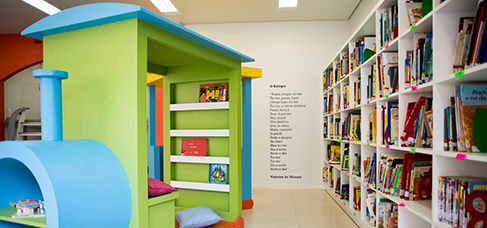The Professional Master's Degree in Language and Literature is a Strictu Sensu Graduate course, recognized by the Ministry of Education’s Coordination for the Improvement of Higher Education Personnel (CAPES). This Master's Degree aims to train professionals to think critically about their students’ linguistic abilities, in order to qualify their performance in reading, as well as in oral and written expression.

AREA OF EMPHASIS: TEACHING OF LANGUAGE AND LITERATURE
This area of emphasis has as its scope the study of contemporary linguistic and literary theories, aiming to show how theoretical advances in the Teaching of Language and Literature field contribute to qualify teaching practices in elementary and middle school environments.
Objectives
- to broaden the knowledge on language and literature, enabling alumni to have a mature intellectual positioning when interacting with their students’ linguistic realities, in order to qualify students' performance and linguistic knowledge;
- to train professionals with innovative profiles and contribute to their language and literature teaching qualification;
- to contribute to language and literature teaching qualification in basic education, aiming to increase the functional literacy index at all levels, thus promoting proficiency in reading and writing skills;
- to contribute to language and literature teaching qualification in basic education, in order to reduce school dropout rates;
- to expand multiliteracy in basic education students, in order to promote their effective insertion in the globalized world mediated by technology;
- to contribute to the reduction of linguistic and social prejudice, and access to cultural goods through discussions on culture;
- to train teachers to create innovative teaching materials based on contemporary linguistic and literary studies, taking into account technological resources;
- to prepare teachers to work with heterogeneous classes in terms of typical and atypical development.
Target audience
Graduate students with Degrees in Languages, Literature and Pedagogy.

AREAS OF EMPHASIS AND PROFESSIONAL PROFILE
From the area of emphasis, the lines of research and their objectives, the Professional Master's Course in Literature quality teachers to:
- respond to advances in knowledge in the area of Literature, required for the competent performance of teaching in Basic Education;
- to position oneself intellectually in relation to the students’ linguistic realities, observing language their understanding of the world;
- to understand the functioning of the Portuguese language, both in grammatical and discursive perspectives, in order to promote their students’ effective linguistic competence, in oral and written modalities;
- to recognize language as a national identity affirmation factor;
- to have knowledge of the literary system and its collection, as well as studies on reading, to create proficient readers;
- to recognize national culture’s complexity and its importance in teaching, in order to propose actions that promote student participation in the society in which they are inserted more critically;
- to analyze and produce teaching materials for language and literature classes, considering the use of technology and open learning environments;
- to know the history and the contemporary conception of childhood, in order to critically analyze the cultural production for children and teenagers, observing their teaching possibilities.
- These same teachers should be able to commit themselves to an ethical stance in the face of challenges in the teaching profession, in public or private institutions, as well as in non-formal teaching spaces.
Fields of research
Language and Literature: reflections on language
This research area aims to deepen the knowledge about language. Thus, it includes the following themes: language acquisition, fundamentals of the Portuguese language, literacy, reading, reader formation and textual genres, exploring technological resources for the production of teaching materials.
Language and Literature: languages in context
This research area investigates assumptions in which language is treated from an interdisciplinary perspective, seeing it as a form of cultural manifestation. From this point of view, the following themes are explored: text construction processes, analysis of literary texts, text reception, reader formation, and text and context correlations, exploring technological resources for the production of teaching materials.
Background
The Professional Master's Degree in Language and Literature was recommended by Capes at the 157th Meeting of the Scientific Technical Council of Higher Education - CTC-ES, held from March 24 to 26, 2015, and installed from the second half of 2015. It originated from Articulation between the research groups Languages and Cultural Manifestations and Informatics in Education, more specifically, the lines of research Acquisition and Development of Language, Aesthetic Languages: Processes and Production, and Information Technology Applied to Education.
By engaging the areas of Education, Information Technology and Culture, and with contributions from related areas, the course proposal absorbed the knowledge attained by the researchers in their study groups, which addressed, among others, the following topics: Language acquisition and new technologies; Poetic reflections on the work by Machado de Assis; Background-literary relations between Brazil and Portugal; Contemporary Brazilian literature; Reading and writing; National Pact for Literacy at the Right Age - PNBE and PNAIC; Learning environments on the web; Mobile and Ubiquitous learning. These topics were grouped around a centralizing nucleus: Teaching Language and Literature, which became the area of emphasis of this Master’s Program.
Coordination committee
Coordinator: Juracy Ignez Assmann Saraiva.
Substitute coordinator: Ernani Mügge.
Teaching representative: Ernani Cesar de Freitas.
Teaching representative: Roswithia Weber.
Student representative: Mara Nelise Ferreira Corrêa.


